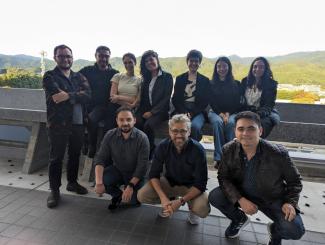AlSur at IGF 2023: Reflections on Internet Governance and Future Challenges
From October 8-12, the eighteenth Internet Governance Forum (IGF) was held in the city of Kyoto, Japan with an agenda centered around concerns for the deployment of Artificial Intelligence (AI) technologies, climate resilience and the deepening of the Global Digital Compact (GDC). AlSur organizations were present in 11 sessions and made progress in the development of their governance and Strategic Plan.
The Internet Governance Forum (IGF) is a space organized annually since 2006 with the intention of bringing together multiple stakeholders - governments, companies and platforms, civil society and academia - to discuss critical issues affecting the Internet. This year, in its eighteenth edition, the IGF was marked by several themes including rethinking internet governance itself - an aspect that, in view of the Future Summit promoted by the United Nations and a greater imbalance of power with platforms and large internet companies, takes on special relevance.
Internet governance came into debate with the upcoming presentation of the Global Digital Compact (GDC) document, which received contributions from various global organizations, including AlSur. The GDC was thus present in the opening remarks of the United Nations Secretary, Antonio Guterres, who also emphasized the need to bridge digital divides and promote a rights-based perspective. In the various sessions that focused on the GDC and internet governance, it was made explicit that it is necessary to innovate in the mechanisms of participation and inclusion of marginalized actors - not only at the level of consultations, but also in decision making.
Another topic in focus that received special attention was the regulation of AI technologies. The Prime Minister of Japan, Fumio Kishida, commented in his opening speech on the risk involved in generative AI and alluded to the process Japan is undergoing to create its regulation, the Hiroshima process. Thus, a large number of other sessions presented advances in different countries and contexts, showing the accelerated race to implement new regulations that allow limitations to be placed on the deployment of AI.
No less important was the presence on the agenda of other critical issues. The climate crisis led several actors to mention the need for more resilient and sustainable approaches, although still with few solutions. There were also discussions regarding the processes of internet fragmentation driven by more authoritarian states, together with the increase of internet disruptions in several countries, violating several rights.
AlSur and the Global South
Given that this edition of the IGF was held in a country that was difficult to access for various reasons, the participation of civil society from the global South was more complex - not to say, reduced. Despite this, there was a notorious participation of various organizations, as well as pronouncements from coalitions and networks.
The AlSur consortium, for its part, contributed to at least 11 sessions on various topics of interest with respect to its Strategic Plan, such as surveillance in public spaces, disinformation processes, online gender violence, digital inclusion, digitization of legal identity, among others.
In addition, AlSur organized its annual meeting to advance its strategic planning agenda. The organizations took advantage of being together in Kyoto to dedicate an entire day to finalize the design of their governance schemes, with a view to a process of institutional strengthening that has been implemented since 2022. At the same time, they consolidated the Strategic Plan 2023-2026, which is gradually taking shape, and began to analyze the concept and scope of the effective participation of the global South in international forums.
With these advances, the consortium has been strengthened and is preparing to implement new projects to reinforce its impact in its three main lines of action: access to the Internet, freedom of expression and online privacy.
Towards the next IGF?
This year's IGF closed in an ambivalent way. On the one hand, expectant to deepen the discussions that were part of the agenda, in what we understand is a critical moment for the internet due to the geopolitical crisis with two conflicts that could escalate globally - Ukraine and Palestine -, the race for AI regulation, the deepening of the climate crisis and the existing imbalances due to the greater power and control of companies and platforms. At the same time, the next IGF will follow the outcomes of the Global Digital Compact and the Future Summit, which is a time to realign expectations and strengthen partnerships.
However, the IGF also announced its next venue: Saudi Arabia. This decision generated the discontent of civil society, which asked to reverse this decision due to the country's record of violating human rights and the potential risk that its members could have for their participation due to the lack of guarantees for their participation. The absence of civil society undermines the multi-stakeholder model on which Internet governance is based.



